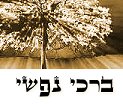Barakhi Nafshi et Adonai
Bless the LORD O my soul

Bless the LORD, O my soul: and all that is within me,
bless his holy name. (Psalm 103:1)

If you enjoy something in this world
without saying a blessing, it is as if you stole it.
- Talmud Berachot 35A
ewish tradition requires that we personally bless the LORD for each detail of our daily experience. Such a requirement (if not practiced legalistically) surely points to a deep inward appreciation for the good things God personally provides for us throughout each day.
Learn Hebrew
As the Lord Jesus said, our heavenly Father knows the very number of the hairs on our head (Matt 10:30), and -- if our eyes are open to His grace -- we too will notice His provision even in the smallest details of our lives. And we will thank Him for His care.

It is interesting to note that the word translated "blessed" (barukh) is related to the Hebrew word for "knee" (berekh), as is the word for "blessing" (b'rakha), thus implying an association between humbling ourselves (i.e., kneeling before Him in recognition of His blessedness) and receiving personal blessing from Him. Indeed, "Blessed be the God and Father of our Lord Jesus Christ, who hath blessed us with all spiritual blessings in heavenly places in Messiah Jesus" (Eph.1:3).

Note: Some people find the idea of berachot confusing. How can a mere human "bless" God? Is not the one who confers a blessing greater than the recipient? Perhaps the confusion will dissipate once we understand that when we recite a bracha, we are not blessing God but are expressing how blessed God is: "Blessed are YOU, LORD Our God..."
Expressing Gratitude
The Essence of the Berachot
At bottom, reciting blessings is a means of expressing your gratitude for the gift of life that God has freely given to you. "Freely you have received, freely give," as our Master Yeshua has taught us.
In that regard, a human life lived with a grateful attitude is itself a form of blessing, as this old Chassidic story will relate:
A chassid once asked Rebbe Elimelech, "How is it possible to bless God for bad news with equal fervor as for good news?"
"Go to the study hall" replied the Rebbe," and ask your question to my brother, the saintly Reb Zusia."
When the chassid saw Reb Zusia, he could easily discern the suffering this man must have experienced during his lifetime. The pain of illness, tsuris and poverty were all etched indelibly on his face. The chassid then asked Zusia, "How is it possible to bless God for bad news with equal fervor as for good news?"
Reb Zusia replied, "But why are you asking me? How would I know the answer? Nothing bad has ever happened to me!"
I am sure the point of this story is not lost on you, my dear reader. Everything depends upon your attitude. God is One. His will is perfect. If you want joy in this life, you must learn to focus on the good. As Ben Zoma said (Pirkei Avot) "Who is a rich person? One who is happy with his lot":

Engaging the mind with the awareness that God is the Source of all that is good is a means, then, of increasing your joy in this life. And that's what the Hebrew blessings are all about.
Transliteration:

Barakhi nafshi et-Adonai, v'khol-keravai et-shem kodsho.
Hebrew for Christians
Copyright © John J. Parsons
All rights reserved.